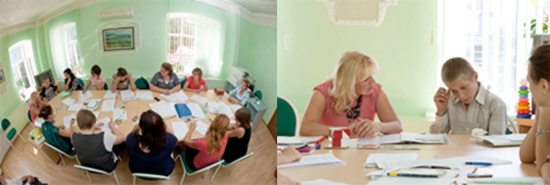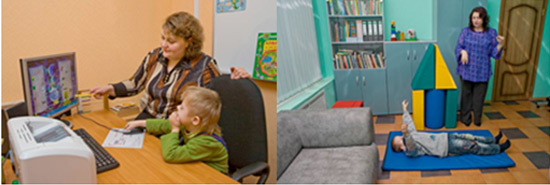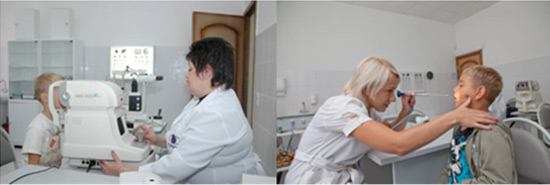

Volume:4, Issue: 2
Aug. 15, 2012


Aug. 15, 2012
DESCRIPTORS: limited abilities, diagnosis, medical and social consultations, psychological-medical-pedagogical committee, a unified team of specialists, individual program of instruction, protection of the psychic and social well-being of the children, early intervention.
SYNOPSIS: The authors provide a comprehensive description of the Kursk Psychological-Medical-Social Support Center and its work with special needs children and with the parents, educators, and medical personnel of the Kursk Region.
According to data supplied by the Committee on Education and Science for the Kursk Oblast (Region,) 66, 616 pre-school children and 102, 446 school age (6 to 17 years of age) reside in the region as of October 1, 2011. Of this number 3, 273 children have been classified as “invalids” or “disabled” in some way. This figure represents around 2% of the general student population. Of these 3,144 receive an education under the label of “Limited Health Abilities.” 1,207 receive it in a general-education school, 429 at home, and only 392 in the public, special education system. Even though our region has all types of special (corrective and rehabilitational) institutions for children with “limited abilities,” in some cases it is difficult for them to gain access to a quality education from the particular institutions in the area where they live.
A regional analysis of the situation shows that in the Kursk region, there continue to be acute, educational problems for students with special needs. In some cases they are not making “normal” progress in a public school. A second problem is the very limited support for teachers and medical workers who are supposed to work with the disabled children in those schools.
In the opinion of the authors, the following were key problems for our region. There was a great need for:
The Kursk Regional Center for Psychological-Medical-Social Support was created in 2004 as a response to these kinds of problems. The Center has become not only a practical-oriented but also a scientific-research and experimental “platform” for the area. Here, education, instruction, and child development problems are tackled jointly by professional educators and medical experts. The basic goals of the Center’s activities are: to render specialized help to children; to test and examine their difficulties with instruction, social adaptation, and development; and provide them, their parents, and their teachers with psychological, pedagogical, medical, and social support.
For a child to be “admitted” to the Center, parents and teachers must supply us with preliminary records by using our integrated information system that is a local net-site and electronic registry. They come from all over the oblast in order to get help from our educators, psychologists, speech therapists, and special education teachers. The greatest demand is for our medical field specialists such as the ophthalmologist; ear, nose, and throat (ENT) specialist; orthopedic doctor; and especially the children’s neurologist.
Notwithstanding the colossal workload, we have one particular rule that we never break. Each little visitor is never given less than 30-40 minutes of attention from a specialist. From the very first visit, we investigate the child’s problems thoroughly so that we can find the very best ways to deal with it.
The Kursk Center is basically an educational institution, but its work is significantly broader than just offering traditional, pedagogical assistance as can be seen from the following list offerings:
During our seven years of existence, the specialists of the Center have worked with more than 20,000 children; around eight thousand parents; more than three and a half thousand workers from the public education system, social security, and public health sectors of the region; as well as a great number of students.
The Center functions within a systematic coordinated structure of sub-units. These are the psychological-pedagogical, medical-social, and psychological-medical-pedagogical committees of the Kursk Oblast.
Admission to our Center is the domain of our psychological-medical-pedagogical committee which utilizes a multi-leveled, diagnostic approach. The specialist members of this committee conduct individual investigations, observations, and tests on the young applicants. Afterward, they give recommendations on the formation, development, instruction, medical treatment and prevention of possible complications and implement a form of supervision for these children as they move through the dynamics of the admittance process. When necessary, they conduct supplemental tests and provide additional consultations.
We have found one aspect of the admittance committee’s work to be especially effective. A sub-team of four specialists (educational psychologist, neurologist, speech teacher, and psychiatrist) meet and interview the parents. The collegiality of our team members guarantees a thorough approach to the procedure of observation, investigation, and testing of children with complex, structural defects and/or a multi-faceted collection of problems. This aspect of professionalism allows us to define an appropriate form of help for the child; to recommend strategies; prescribe a sequence of support within in a full educational plan; assure the receipt of appropriate, medical assistance; and also guarantee full confidentiality to our clients.
The Psychological-Medical-Pedagogical Committee of the Kursk Oblast (PMPK) provides for a complex, multi-profile evaluation of young children and teenagers. The Center’s role is to define the character of the educational conditions essential for success as well as the medical, social, and psychological assistance that will be needed.

The Kursk Oblast boasts a system of cooperative, central (oblast,) territorial (inter-district,) psychological-medical-pedagogical (PMP) committees and medical consultative groups for educational institutions. These are well organized and work with relative precision. The Kursk PMP cooperates with the PMP consultative groups for the various pre-schools, public schools, and other educational institutions and establishments of the Kursk Oblast’s social services, providing them with consultation services, and organizational, methodological, and informational support. The PMP’s of the diverse institutions of the region are accountable to the central and territorial PMP committees.
The Central PMP Committee of the Kursk Oblast works as a unified team of specialists, jointly planning and providing diagnostic testing for a child, and then coming to a collegial conclusion regarding its findings. Testing is conducted in the presence of committee observers and is videoed for future use.
The basic, operational principle of the Kursk Center PMP is to “once and for all” dispel the idea that a child is “un-teachable.” The committee strives to insure that each child receives an individual, educational plan of action that is compatible with his/her psychological and physical ability for mastery. The recommendations of each specialist are presented to the child’s teachers and family. They follow the prescription of the medical doctors. While the child is being taught in accordance with his/her individual program of instruction, the committee focuses mainly on:
The uniqueness of the Center for Psychological-Medical-Social Support’s work consists in the continuity of its services; in its potential to provide for each child not only a complete and professional evaluation but also on-going and complex support, efficient control of the dynamics of his development with the goal of potentially correcting and improving his/her educational conditions. After completing the initial testing at the Center, children visit a speech therapist, psychologist, and special education teacher. They are observed by medical specialists and receive help in further consultations. Our specialists are obligated to discuss the Center’s recommendations during regular consultations with the special education and other of the child’s teachers in the child’s school.
The main responsibilities for the psychological-pedagogical services of the Center are protection of the psychic and social well-being of the children along with provision of assistance in optimizing their personality development and social adaptation. With these goals in mind, the Center’s educators utilized the latest and most effective methodologies such as: complex, medical-pedagogical corrections for attention deficit syndromes, hyperactivity, aggression, fears, disturbances of child-parent relationships, speech therapy correction, a broad spectrum of difficult, speech difficulties, as well as pedagogical preventive maintenance for mastering the educational curriculum.

The work with families only comes to an end when the problem is solved.
The pedagogical, psychological, and speech therapy correction workers at the Center employ not only traditional but also computer methods in diagnostic and correction. They use interactive programs for developing higher, psychic functions; the emotional-volitional spheres; and speech. One of the specialists’ most demanding and purposeful endeavors is the correction of a range of disturbances by means of biological connection reversals utilizing computerized programs designed for correcting complex, psycho-emotional conditions. Uniquely, these teacher specialists collaborate closely with the medical doctors of the Center in making decisions regarding each child.
Using the most modern equipment, the medical personnel diagnose various illnesses, work to preserve the physical health of the child clients, and define the optimal form of medical services for them. Pediatric doctors (neurology, psychiatry, ophthalmologist, ENT’s, orthopedic specialists, medical psychologists) conduct individual tests and give recommendations for the treatment and prevention of a broad spectrum of our clients’ illnesses. When diagnosed illnesses require movement support, one appliance that we have found to be quite beneficial is a children’s orthopedic apparatus called in Russian, Podoskop. It is an adaptive device to control surface(s) of the arch of the foot. Our neurologist treats a broad range of illnesses using the tools of Quantum Medicine.

Every day at the Center, we emphasize the necessity for the early referral of child clients in order for us to render appropriate correction techniques and effective therapies. For this reason, we decided to make early intervention a priority.
Our analysis of the available, statistical data showed that, for the past year, the population of the region increased by 4%. The number of “first” children grew by 1%, “second” children by 7%. The number of twins and triplets increased while the rate of infant mortality declined. Accordingly, the number of children with disabilities and health problems up to age 3 increased. The number of children referred to the Center from birth to three years of age tripled. Of those referred to our pediatric neurologist, the greatest number were children in the first year of life diagnosed with perinatal encephalopathy. During the last year alone, 820 parents with very young children applied to the Center. Of these, 548 cases were for the neurologist.
The Center now provides early and all embracing help by means of an adaptive program for early intervention (children from birth to 3 years of age.) This program we call “Rastishka” or “Nurturing Little Ones.” It is for birth to one year-olds. “Ryadom s Toboi” or “Alongside You” serves one to two year-olds. “Razvitiye” or “Development” is for children from two to 3 years of age. These programs are designed for individualized work with children who are developing normally and for those with developmental disturbances. They also provide consultative help for the parents. For parents, teachers, and specialists, we constantly issue reading material in the form of “reminders” and booklets on the problems of early development, formation, instruction, and various ways to make children healthy. Along with these, we offer a collection of practical advice and recommendations.
Our specialists devote particular attention to children with limited abilities in that there are a number of young “invalids” or disabled children living within the boundaries of the Kursk Oblast. During the 2010-2011 school year, 6,793 infants with special needs visited the Center. From that number, the specialists of the Center helped choose appropriate forms of instruction and work up individually oriented programs in accordance with the psychophysical peculiarities and abilities of those children with health limitations. We fully support families in the process of raising children with developmental disorders. We assist them to expand the abilities of their child so that he/she can be fully integrated into society.
An analysis of the situation shows that our oblast’s pre-schools are trying to educate a significant number of children with physical and psychological disorders. However, not every educational establishment is prepared to take on such children successfully. They do not have the qualified specialists, methodologies or the systematic requirements for doing so.
During the first year of the Center’s existence, we defined and prioritized our interactions with educational institutions in the region. We decided that we would render assistance in the formation of inclusive, educational environments (IOC) in the region’s broad network of special, corrective-education schools. However, the parents of children with limited abilities objected to this plan and insisted on their children being instructed in their local, public schools, since they couldn’t envision their children being successful in life. These parents wanted their children to learn while being integrated in normal society.
The psychological-medical-pedagogical (PMP) committees for the various educational institutions in the region took upon themselves the task of creating a systematic environment for “inclusive education.” At the present time in the Kursk Oblast, there are more than 170 PMP committees. We are pleased and proud that these committees chose us to cooperate with them in the creation of the necessary, inclusive methods and techniques.
An important part of our work at the Center is the development and expansion of teacher knowledge concerning contemporary approaches to the instruction of various categories of special needs students. With this goal in mind, our specialists organize pragmatic conferences, seminars, and round-table discussions based on the latest scientific principles and practices. We publish methods’ textbooks and collections such as: “Psychological-Medical-Pedagogical Committees: Technologies for the Organization of Diagnostic and Developmental Correction Activities;” “The Organization of the Activities of a PMP Committee;” “Designing Inclusive Educational Environments;” “The Organization of Individualized Instruction in the Home of a Child with Limited Abilities;” and many others. We insure that materials concerning the activities of the Center as well as advice and recommendations of our specialists are published regularly in professional periodicals.
The Kursk Oblast Center for Psychological-Medical-Social Support is a professional team working within a complex regional system of assistance for children with special educational needs including those with limited health abilities. The Center functions with the goal of interdepartmental cooperation with educational institutions, the Offices for the Social Protection of the Population, public health officials, the Federal Bureau of Medical-Social Experts, the Department for Care and Guardianship, the Family and Demographic Policy Office of the Kursk Oblast, the Institute for Continuing Education for Specialists in the Education System, Kursk State University, and other organizations.
The basic object of all of these activities is the creation of a system of coordinated yet diverse social partners in our work with families and children.
Concerning the very real problems of children with special needs, we have decided to work unswervingly to reveal their true potential, develop their full personalities, expand their self-images, and reduce as much as possible the consequences of negative experiences in their social environment while positively enabling their successful rehabilitation and adaptation to society.
The Kursk Center’s major purpose for existing is to help provide for the successful socialization of children with limited abilities. This includes those classified as “invalids” as well as other children with special education needs. We do this because we sincerely believe that each child has the right to a happy and worthwhile childhood.
Our many faceted Center with its multi-functional, assistance structure enables us to solve many problems and answer critical social questions of our modern society. The specialists of our Center are also able to promote the optimization of our regional components in a support system that is in complete harmony with the needs of our oblast, and the requirements of its parents and children.
Home | Copyright © 2025, Russian-American Education Forum